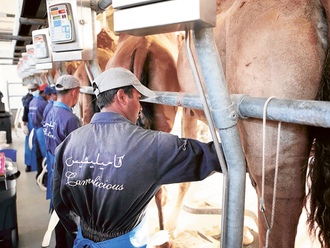
Much as you wouldn’t eat a mouldy sandwich or tuck into a rancid yogurt, if you opened your favourite face cream to discover it thick with green fungus, you’d probably think twice before rubbing it into your skin.
But the chemical preservatives saving your beauty potions from the ravages of time have been linked with a whole host of health problems – from cancer to infertility and skin damage – raising major concerns with millions of cosmetic consumers who were previously unaware of the health risks they pose.
We get under the skin of the organic versus not organic debate and ask, should we or shouldn’t we go green in our make-up bags?
The paraben problem
Parabens are chemical preservatives designed to extend the life of everything from food to pharmaceuticals, and can be found in up to an estimated 90 per cent of beauty products on the market. Used to fight bacteria and fungus, it is parabens – the most common being methylparaben, ethylparaben, propylparaben and butylparaben – that stop your cosmetics from going off after you’ve opened them, and keep them ‘fresh’ for anything up to three years.
Thanks to their low cost and significant abilities in extending a product’s shelf life, parabens have been intrinsic to the cosmetic and skincare industry for decades. But after a 2004 study linked the use of parabens to breast cancer, and further studies suggested they were a contributing factor to infertility and reproductive issues, birth and developmental defects and early-onset puberty, paraben use has become one of the most controversial topics in beauty, with many scientists considering them a danger to public health, whilst others believe them to be not only safe, but essential
to the continued growth of a multi-billion-dirham global industry.
A report published in 2004 by The Journal of Applied Toxicology, sent shock waves around the world. It claimed that parabens, which are found in everything from shampoos to sunscreen, enter the body through the skin and mimic the hormone oestrogen, which is known to play a role in the development of breast cancer. Furthermore, researchers found concentrations of these synthetic preservatives, particularly methylparaben, in human breast tumours, claiming that from their sample of 20 cancerous tumours, 18 contained “significant concentrations of parabens”, with almost all of the tumours tested originating from products applied to the skin, like deodorant, creams or body sprays.
However, the validity of the study was questioned by the American Cancer Society, and the Food and Drug Administration and Cosmetic Ingredient Review found that every kind of ingestible paraben was “not even close to being unsafe”. Furthermore, skincare giants including Dermalogica continue to support the use of parabens in their products, and believe them to be the only safe option in a marketplace that is being ‘forced’ to formulate without them. “Parabens are the go-to preservative of the beauty industry,” says Dermalogica’s president of research and development, Dr Diane Hayward. “They are one of the best preservatives you can use to maintain the safety and integrity of a formulation, and are the least toxic. We test our products exhaustively, and I would never recommend that anyone use a non-preserved product. The safety reports on parabens are 100 per cent convincing to me, and the critical matter should always be safety first.”
Dr Hayward goes on to suggest the study igniting the debate was flawed from the start, with no control group, no comparison of paraben levels in non-cancerous cells and used a sample size that was too small to offer conclusive proof of research.
“The research findings were taken out of context, and caused an outcry,” she explains. “But rather than being able to step back and make a scientific and informed decision about the safety of synthetic preservatives, and their alleged links to cancer, there’s been a knee-jerk consumer reaction to an emotionally charged topic, resulting in unfounded fears about the use of parabens across the board.”
Better safe than sorry
While many scientific organisations consider the negative research concerning the safety of parabens to be inconclusive, cosmetic consumers are understandably more cautious about buying goods that contain any of these supposedly dangerous substances. But how can you tell if your favourite beauty buy contains a potential carcinogen? It’s all down to reading the label, says beauty blogger, The Paraben-Free Princess. “The best way to take control of your health and protect yourself against parabens is to check the ingredients of everything you are interested in buying online, as you get a more comprehensive listing,” she says. “Start at the bottom and work your way up – the list works by quantity, with the greatest amounts at the top and preservatives often last on the list. If there is an ingredient I don’t recognise, I look it up on the Cosmetics Safety Database (www.ewg.org/skindeep) – then I can make an informed decision about whether or not I want to use the product on my body.”
People power
In response to the increased concern surrounding parabens, the beauty industry has been quick to respond. Organic and paraben-free products are one of the fastest-growing sectors in the beauty marketplace, with cosmetic companies abandoning artificial preservatives in favour of natural ones.
“Since parabens have been proven to create hormonal imbalances that can lead to a myriad of health problems, finding suitable alternatives was essential,” says Balance Wellbeing’s lifestyle consultant, Chandy George. “Natural preservatives like neem oil, sea salts and citric acids deliver excellent results. Reading labels and researching natural ingredients is well worth the time and effort. Eco-friendly and organic ranges provide the smartest, and safest alternative to chemical-heavy beauty products, and are now more readily available than ever before.”
The jury may still be out on whether or not parabens are safe, but in the meantime, if you’d rather err on the side of caution, there are plenty of chemical-free cosmetics to keep you looking young and beautiful without breaking the bank.
“There’s a misconception that organic or paraben-free products are more expensive, but less effective than their preservative-packed rivals,” says Dubai-based beauty expert, Melanie Penny. “This simply isn’t the case. The formulations are just as effective as chemical-based goods, and not necessarily any more costly. While paraben-free product, may not last as long as chemically preserved items, using natural based beauty products is an investment in your long-term health.” This is an opinion held by fellow Dubai beauty professional, Shirley Conlon. With more than 20 years experience as a cosmetologist and facialist, she was inspired to develop her own organic, paraben-free skincare range.
“Just as we are advised to avoid highly processed and preserved foods, this applies to skincare too,” says Shirley. “My philosophy is if you cannot pronounce it, and wouldn’t want to eat it, don’t put it on your skin.”












